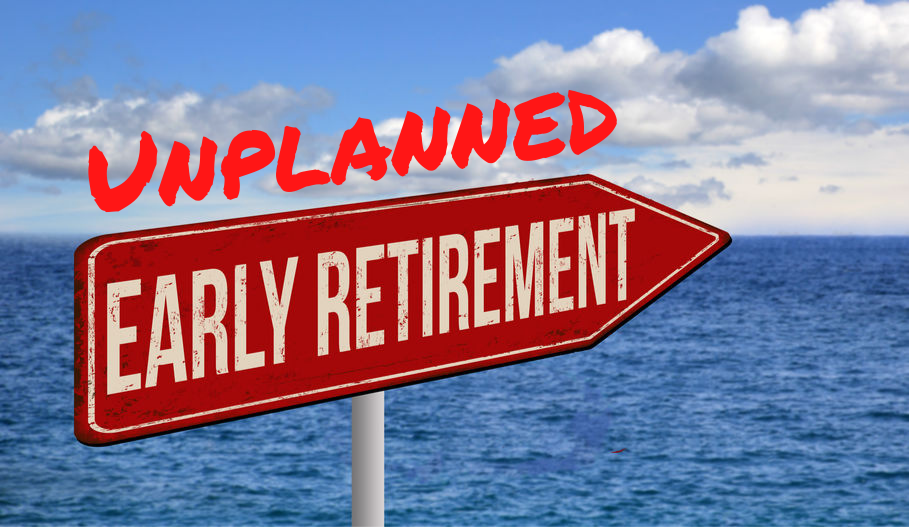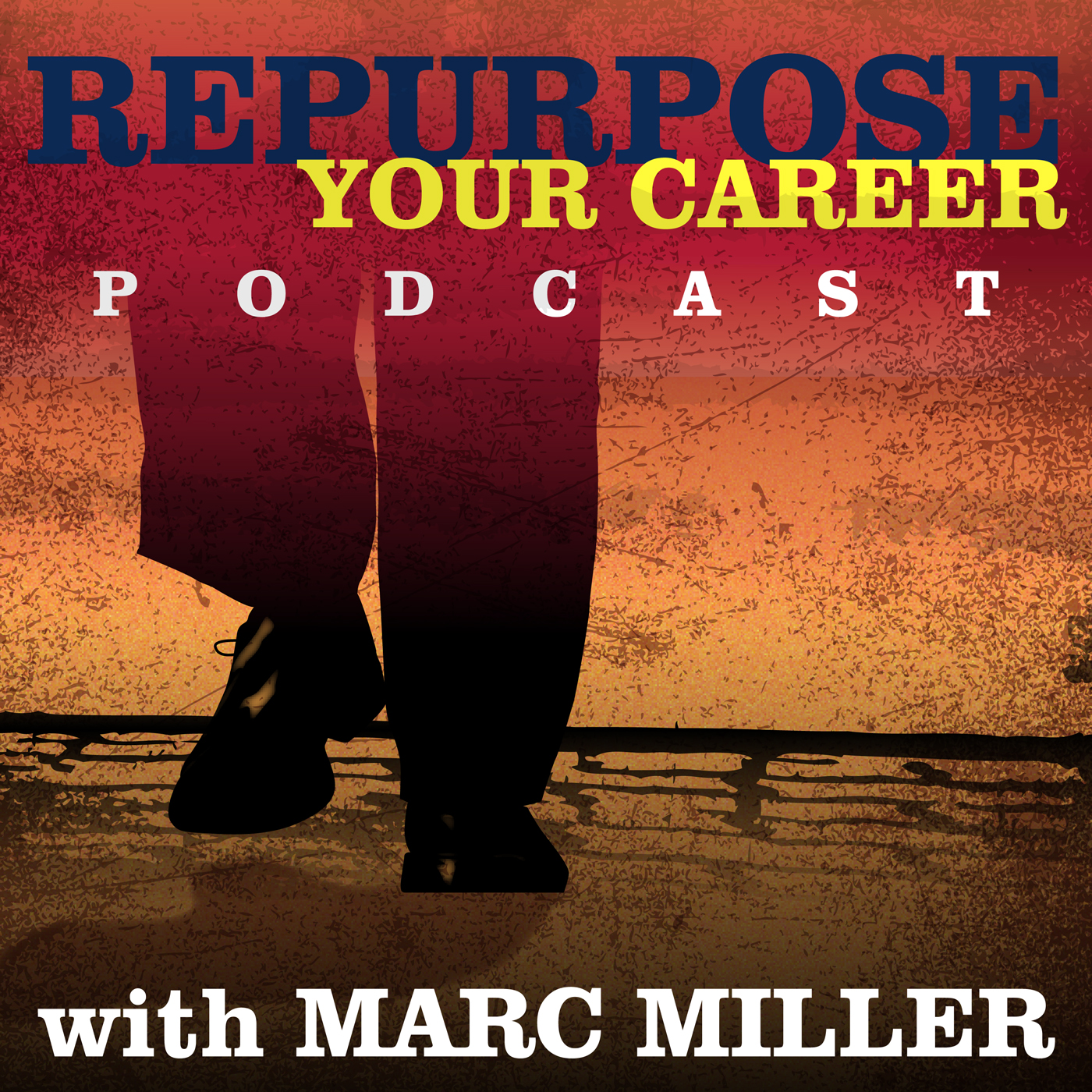Unplanned Early Retirement
 Are you prepared to be forced into an unplanned early retirement?
Are you prepared to be forced into an unplanned early retirement?
I rarely write about retirement on this blog or discuss this topic on the podcast but COVID-19 has changed everything.
Around the same time this blog post gets published I will be publishing an interview with Mark Miller of the Retirement Revised podcast and newsletter.
No, we are not related.
In my discussions with others, I am hearing about 3 trends regarding retirement as it relates to people’s career and money space. There are:
- Those that are later in their careers, successful and retiring now because they are financially able and no longer want to deal with adapting their careers to COVID-19.
- People who are close to retirement age, close to being financially ready, and do not want to return to work. A good example of this will be teachers who do not want to risk re-entering schools.
- Those who are being laid-off and will not likely find a job in their field – at least in the near future.
Mark Miller and I discussed the 3rd group on the podcast.
You will need to plan for your unplanned early retirement.
Shocking Numbers for an Unplanned Early Retirement
Mark references new research by The New School Schwartz Center for Economic Policy Analysis says that 50% of older workers have been pushed into early retirement which accounts for about 3 million people and they expect another 1.5 million to follow them in the coming months.
The report states:
Since March 2020, 2.9 million workers ages 55-70 left the labor force, 50% more than the 1.9 million older workers who left the labor force three months after the Great Recession began in 2007. In percentage terms, 7% of older workers left the labor force in recent months, compared with 4.7% of older workers in the Great Recession.
We have seen this before. During the great recession, we saw an uptick in people taking social security at the earliest age possible of 62. I remember talking to a number of people during the 2011-2015 time frame who took social security early simply because they had to survive. It is too early to tell but this is likely to happen again.
What to Do If You Are Still Working
If you still have a job, congratulations.
Now is the time to save, save, and save some more. Due to the fact that you are probably not eating out, going to the movies, getting on an airplane for vacation, those who are working have more money to save than ever before.
This is the time to sit down with a fee-based financial advisor and evaluate your finances. When I left my last corporate gig, I sat down with my financial advisor immediately after being put in a compromising position. If nothing else it gave me a sense of comfort that I was making a rational decision to leave.
Start making plans for your health insurance coverage. Yikes, this is expensive! Whether you stay on your companies health insurance via COBRA or buy a private plan on the health insurance marketplace check out the costs NOW.
Start your job search immediately. I have been speaking to a lot of resume writers and career coaches about what they are seeing. What they have told me is a lot of their clientele are looking for insurance jobs. They are out looking just in case they are laid off or they feel they are in a vulnerable position in their current position.
Plan ahead for the possibility of an unplanned early retirement even if you are working.
What to Do If You Are Already Unemployed
Take the time to do as I suggest with people who are still employed, talk to a financial advisor, and explore your health insurance coverage. Being uninsured during a pandemic is not a smart thing.
You will need to make an assessment of your near term employability. If you were working in aviation or hospitality industries, you are likely to have a difficult time being re-employed quickly. Those industries will come back but it will be a while.
You may have to consider taking a lifeboat job. This is a new term that was recently introduced to me. If we want to recover from this pandemic we just might have to fill the lifeboats by taking what I have always referred to as survival jobs.
This is a different way of looking at your career. My good friend, Susan P. Joyce, who runs the website Job-Hunt.org is maintaining a list called Top 100 Employers with 1,100,000+ Open Jobs. Many of these jobs are outside of your chosen career path and pay less than what you made before. This is a different kind of recession/depression and it requires a new strategy.
We have several members of the Career Pivot Membership community who have become contact tracers. This is not a glamorous or high paying job. However, it pays a decent hourly salary and at least for one of our members, she gets to work from home. For those of us in the 2nd half of life, this is not the time to be out around other people.
You may just need to find a lifeboat to get on until this is over.
Make a Plan
Create a strategy on how you will survive the next year, as this pandemic will be with us for a while. Even if we have a vaccine by the end of the year, it will take a year or more to deploy. If you want to understand this really complicated environment, listen to the Bloomberg Prognosis podcast episode called, Our Vaccine Expectations Are Unrealistic.
Create a timeline where you are taking regular checkpoints to see how you progressing. Give yourself a fixed amount of time to look for a regular job before you consider a lifeboat position. You may have to get scrappy as Thom Singer spoke about in the podcast episode Pivoting a Speaking Career in a Time of Pandemic.
I want you to rethink your job search process as I wrote in the post Are You Operating Without a Playbook? You Ought to Be!
Now maybe the time to start a side gig. Recessions are often the best time to start a business.
If you want support with getting through this time consider joining the Career Pivot Membership community.
What If You Have an Unplanned Early Retirement
Many of you will have an unplanned early retirement. The numbers are just staggering.
If it looks like an unplanned early retirement is inevitable within a year, I would recommend the following:
- Carefully look at your finances
- Do your homework on when to claim social security
- If you are pre-medicare eligible carefully plan out your healthcare and health insurance strategy to reach medicare eligibility
- Make long term plans on where you will live. I am an expat living in Mexico and that was a conscious decision.
Make taking an unplanned early retirement a conscious choice and do not just let it happen.
What are you going to do?
Marc MillerLike What Your Read? Get Career Pivot Insights
Do You Need Help With ...

Check out our Help Center where you have access to 14 different content portals.


